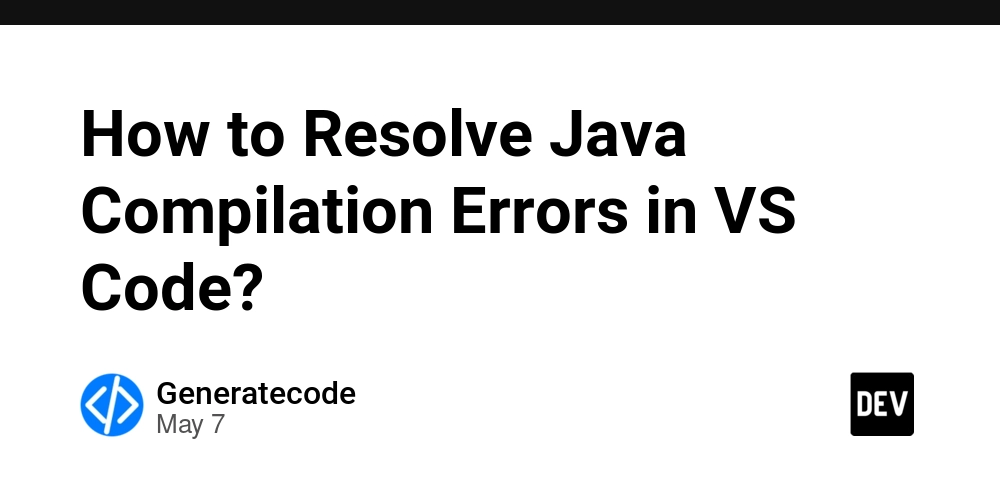How to Resolve Java Compilation Errors in VS Code?
In this article, we’ll tackle the common challenges developers face when compiling Java code in Visual Studio Code (VS Code). If you've been working on a project, such as a learning English application without the internet, you might encounter compilation errors even if your Java version is updated. Why Compilation Errors Happen in Java Compilation errors in Java occur for various reasons, including incorrect project setup, missing dependencies, or Java syntax errors. They can be particularly frustrating when everything seems to be in order. In your case, working with VS Code adds another layer of complexity, as it requires proper configuration to recognize installed Java versions and libraries. Step-by-Step Solution to Resolve Java Compilation Errors in VS Code 1. Ensuring Proper Java Installation First, make sure that Java is correctly installed on your machine. You can verify your installation by running the following command in your terminal: java -version This command will show you the currently installed Java version. Ensure it matches the version needed for your project. 2. Check the Java Extension Pack in VS Code Ensure you have the Java Extension Pack installed in VS Code. This pack includes essential tools needed to develop and debug Java applications. To install it, follow these steps: Open VS Code. Go to the Extensions view by clicking on the Extensions icon in the Activity Bar on the side of the window or by pressing Ctrl+Shift+X. Search for "Java Extension Pack" and install it. 3. Configure the Java Home Path Sometimes, VS Code can fail to detect your Java installation correctly. You may need to set the JAVA_HOME environment variable: On Windows: Right-click on "This PC" and select "Properties." Click on "Advanced system settings." In the System Properties window, click the "Environment Variables" button. Under System Variables, click "New" and add: Variable name: JAVA_HOME Variable value: path to your Java JDK (e.g., C:\Program Files\Java\jdk-17.0.1) Click OK to close all windows. On macOS or Linux, you can add the following line to your .bash_profile or .bashrc: export JAVA_HOME=/Library/Java/JavaVirtualMachines/jdk-17.0.1.jdk/Contents/Home #### 4. Setting Up Your Java Project Correctly Ensure that your Java project is set up correctly. A typical Java project structure should look like this: MyProject/ ├── src/ │ └── Main.java └── lib/ Make sure that your source files (like `Main.java`) are inside the `src` directory and that your classpath is properly set if you are using additional libraries. #### 5. Compiling Java Code To compile your Java project using VS Code, you can do this easily with the terminal: - Open the terminal in VS Code (`Ctrl + `) and navigate to your project folder. - Use the following command to compile your Java files: ``` bash javac src/Main.java This command compiles Main.java located in the src folder. If there are no errors, it will generate Main.class files. 6. Running Your Java Application After successfully compiling your code, run your Java application using: java -cp src Main Frequently Asked Questions Q1: What should I do if VS Code doesn’t recognize my Java installation? A1: Double-check your JAVA_HOME variable and ensure the Java Extension Pack is installed in VS Code. Q2: How can I fix errors related to missing libraries? A2: Include the necessary libraries in your project settings. Use the lib folder to contain your JAR files and configure your classpath accordingly. Q3: Why do I get syntax errors in my Java code? A3: Syntax errors often indicate typos or incorrect use of Java syntax. Review your code carefully for any mistakes. Conclusion Compiling Java projects in VS Code should be a straightforward process if your environment is correctly set up. Follow these steps to troubleshoot common compilation errors effectively. Make sure your Java installation is proper, your environment variables are set, and your project structure is correct. Happy coding!

In this article, we’ll tackle the common challenges developers face when compiling Java code in Visual Studio Code (VS Code). If you've been working on a project, such as a learning English application without the internet, you might encounter compilation errors even if your Java version is updated.
Why Compilation Errors Happen in Java
Compilation errors in Java occur for various reasons, including incorrect project setup, missing dependencies, or Java syntax errors. They can be particularly frustrating when everything seems to be in order. In your case, working with VS Code adds another layer of complexity, as it requires proper configuration to recognize installed Java versions and libraries.
Step-by-Step Solution to Resolve Java Compilation Errors in VS Code
1. Ensuring Proper Java Installation
First, make sure that Java is correctly installed on your machine. You can verify your installation by running the following command in your terminal:
java -version
This command will show you the currently installed Java version. Ensure it matches the version needed for your project.
2. Check the Java Extension Pack in VS Code
Ensure you have the Java Extension Pack installed in VS Code. This pack includes essential tools needed to develop and debug Java applications. To install it, follow these steps:
- Open VS Code.
- Go to the Extensions view by clicking on the Extensions icon in the Activity Bar on the side of the window or by pressing
Ctrl+Shift+X. - Search for "Java Extension Pack" and install it.
3. Configure the Java Home Path
Sometimes, VS Code can fail to detect your Java installation correctly. You may need to set the JAVA_HOME environment variable:
- On Windows:
- Right-click on "This PC" and select "Properties."
- Click on "Advanced system settings."
- In the System Properties window, click the "Environment Variables" button.
- Under System Variables, click "New" and add:
- Variable name:
JAVA_HOME - Variable value: path to your Java JDK (e.g.,
C:\Program Files\Java\jdk-17.0.1)
- Variable name:
- Click OK to close all windows.
- On macOS or Linux, you can add the following line to your
.bash_profileor.bashrc:
export JAVA_HOME=/Library/Java/JavaVirtualMachines/jdk-17.0.1.jdk/Contents/Home
#### 4. Setting Up Your Java Project Correctly
Ensure that your Java project is set up correctly. A typical Java project structure should look like this:
MyProject/ ├── src/ │ └── Main.java └── lib/
Make sure that your source files (like `Main.java`) are inside the `src` directory and that your classpath is properly set if you are using additional libraries.
#### 5. Compiling Java Code
To compile your Java project using VS Code, you can do this easily with the terminal:
- Open the terminal in VS Code (`Ctrl + `) and navigate to your project folder.
- Use the following command to compile your Java files:
```
bash
javac src/Main.java
This command compiles Main.java located in the src folder. If there are no errors, it will generate Main.class files.
6. Running Your Java Application
After successfully compiling your code, run your Java application using:
java -cp src Main
Frequently Asked Questions
Q1: What should I do if VS Code doesn’t recognize my Java installation?
A1: Double-check your JAVA_HOME variable and ensure the Java Extension Pack is installed in VS Code.
Q2: How can I fix errors related to missing libraries?
A2: Include the necessary libraries in your project settings. Use the lib folder to contain your JAR files and configure your classpath accordingly.
Q3: Why do I get syntax errors in my Java code?
A3: Syntax errors often indicate typos or incorrect use of Java syntax. Review your code carefully for any mistakes.
Conclusion
Compiling Java projects in VS Code should be a straightforward process if your environment is correctly set up. Follow these steps to troubleshoot common compilation errors effectively. Make sure your Java installation is proper, your environment variables are set, and your project structure is correct. Happy coding!





































/https://tf-cmsv2-smithsonianmag-media.s3.amazonaws.com/filer_public/67/76/67762ab7-1e65-4fa2-95c8-65661499e376/1_smithsonian_the-squid-run-gathers-_a-blizzard-of-life_-off-californias-coastline-13_web.jpg?#)





































